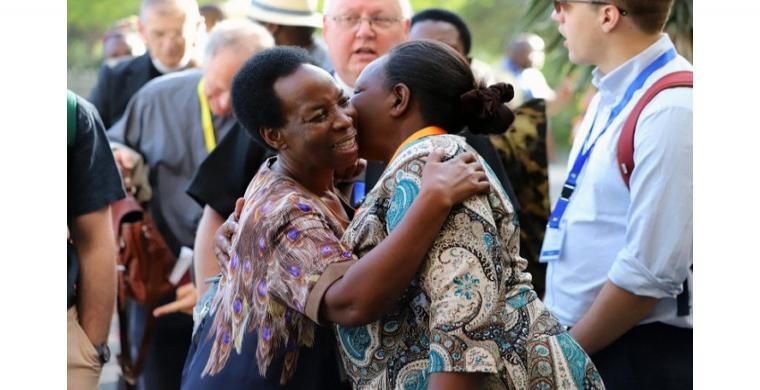No "Fence Sitting" For GAFCON Anglicans
By Jeff Walton
https://juicyecumenism.com
June 18, 2018
The Gospel of Jesus Christ requires people to make a choice, and that Gospel message must be transmitted faithfully, according to speakers on the opening morning of the Global Anglican Future Conference (GAFCON) meeting in Jerusalem.
"Some people like Pilate want to take a pass on deciding about Jesus," assessed Bishop Alfred Olwa of the Diocese of Lango, Uganda in a morning bible study drawing upon Luke Chapter 22:66-23:25. "Some people fear the jeering of the crowd more than the judgment of God."
Olwa spoke before nearly 2,000 Anglican Christians assembled for the quinquennial conference, the central gathering of an orthodox reform movement within the worldwide Anglican Communion. Delegates have gathered from more than 50 nations to strategize mission, hear teaching and, in the words of conference organizers "proclaim Christ faithfully to the nations."
A sense of urgency pervaded the presentations; early on in the conference was a clear repudiation of the prosperity gospel.
"Some people are interested in Jesus only as long as he is blessing them," Olwa observed. "They proclaim prosperity, not the true Gospel."
False promises of prosperity were one of several distortions of scripture which speakers warned against, distortions which cut across cultures and damage the witness of the church.
"Any distortion of the scriptures is a distortion of the Gospel of God and therefore a false gospel," declared Archbishop Nicholas Okoh, Chairman of the GAFCON Primates Council in the opening plenary address.
The church, Okoh assessed, "never fits the mood of a particular age because it is made for all ages" and "a gospel without offense is no Gospel."
Instead, the Metropolitan of the Church of Nigeria -- the largest Anglican Communion province -- insisted "preaching must not be compromised, but is to be discharged faithfully in every generation, as Christ is the same yesterday, today and forever."
The senior Nigerian Archbishop noted that making a choice means drawing a line: between those who embrace Christ's message, and those who have chosen not to. Rival teachings found within parts of the worldwide Anglican Communion were squarely in his sights.
"The false Gospel of inclusion without repentance has been embraced by North America," Okoh warned about teaching from officials in the U.S.-based Episcopal Church and the Anglican Church of Canada. "If we walk together with those who deny the orthodox faith, in word or deed, we have agreed that orthodoxy is optional."
Okoh also argued for an Anglicanism centered upon mutually held core beliefs, rather than mere historic ties among the international family of churches descended from the missionary activity of the Church of England.
"We do not accept that the office of Canterbury defines Anglicanism," Okoh summarily declared about the centrality of institutions anchored and funded in the Global North. "The Gospel is given to us ... we must be willing to challenge church leaders who deny the apostolic boundaries of the Gospel."
An afternoon session featured another voice from the rapidly growing Global South contingent within the Anglican Communion. The Rt. Rev. Miguel Uchoa, recently installed as the first archbishop and primate of the Anglican Church in Brazil, spoke about ministry in his South American nation. Uchoa was bishop of the Diocese of Recife which withdrew from the Episcopal Anglican Church of Brazil (IEAB) in 2004. Following strong growth, the Diocese of Recife split into three dioceses that form a new Anglican province, the Anglican Church in Brazil, operating parallel to the IEAB. The Archbishop of Canterbury and the official instruments of the Anglican Communion only recognize the IEAB, but GAFCON has strongly supported and embraced the new Anglican Church of Brazil, which is theologically conservative and opposes same-sex marriage innovations that the IEAB recently approved.
This move to effectively bypass existing Anglican Communion structures closely follows the same move by GAFCON officials to embrace the Anglican Church in North America, formed in 2009 from churches and dioceses which split from the U.S.-based Episcopal Church.














